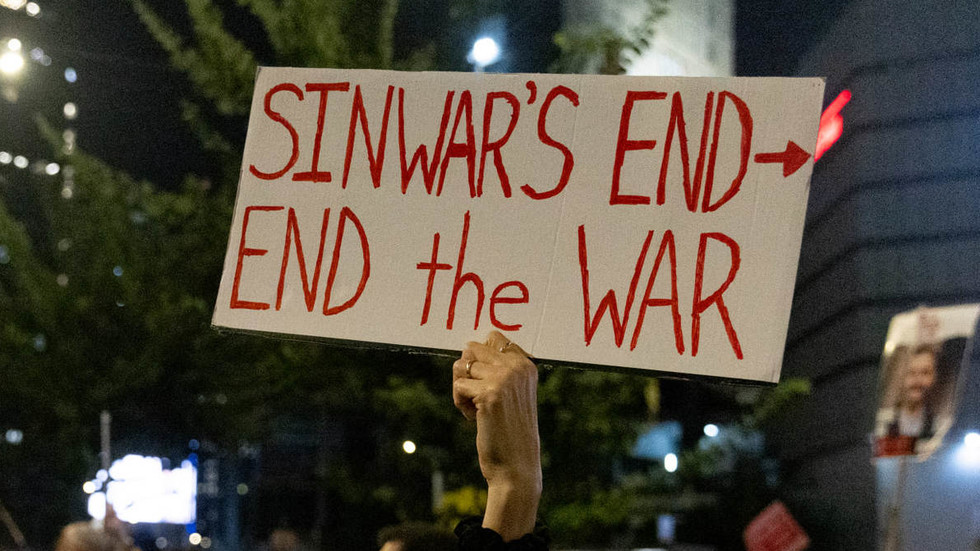The death of Yahya Sinwar, the political leader of Hamas, in a firefight in Gaza has been met with praise from high-ranking officials in the United States, United Kingdom, France, Germany, and Italy. Announced by the Israel Defense Forces (IDF), the confirmation of Sinwar’s identity through DNA testing marks a significant moment in the ongoing conflict. In a statement reflecting on this event, President Joe Biden expressed that this is a pivotal day for not only Israel but also for global security, signifying that terrorists cannot evade justice. He subsequently drew parallels between Sinwar’s death and the US killing of Al-Qaeda leader Osama Bin Laden in 2011, hinting it could pave the way for a future devoid of Hamas influence in Gaza. President Biden signaled his intent to discuss potential peace strategies with Israeli Prime Minister Benjamin Netanyahu as the US has been closely collaborating with Israel in tracking top Hamas leaders.
Supporting Biden’s sentiments, Vice President Kamala Harris declared that justice has been served, asserting that the world is now in a better place following Sinwar’s elimination. Highlighting the opportunity to resolve the Gaza conflict, she reiterated the notion that Hamas’s absence could allow for a more hopeful future for the people of the region. The officials’ reactions underscore a collective relief among Western leaders regarding the potential ramifications of Sinwar’s elimination, indicating a turning point amidst the ongoing war, which has markedly escalated since the escalation of violence initiated by Hamas in October 2023.
French President Emmanuel Macron noted Sinwar’s culpability in orchestrating the violent attacks and barbaric acts of October 7, while also urging for the immediate release of hostages taken by Hamas. His comments reflect a broader concern for those still held captive amidst the warfare, demonstrating how the repercussions of Sinwar’s leadership extend beyond the battlefield into humanitarian crises. German Foreign Minister Annalena Baerbock echoed these sentiments, condemning Sinwar’s acts of terrorism and expressing hope for Hamas to surrender to alleviate suffering within Gaza. Both leaders appeared to connect the fate of Sinwar with broader calls for a resolution to the humanitarian crisis faced by civilians.
Echoing the sentiments of his counterparts, Italian Foreign Minister Antonio Taiani also praised Israel’s military action as a form of self-defense against terrorism. He conveyed hope that Sinwar’s death might catalyze a ceasefire in the region, emphasizing the dire need for peace amidst the ongoing violence. Similarly, UK’s Defense Secretary John Healey did not hesitate to condemn Sinwar, laying responsibility for the tragic October 7 incident firmly at his feet while recognizing the ongoing civilian toll on both sides. Healey acknowledged the complexities of the situation, affirming that despite the significance of Sinwar’s death, it cannot overshadow the dire consequences that have resulted from the prolonged conflict.
The conflict escalated dramatically following the October 7 attacks by Hamas, which resulted in the deaths of approximately 1,100 people and the capture of around 250 hostages. The fallout has seen Israel engage in extensive military operations characterized by artillery and airstrikes, which have inflicted considerable destruction and civilian casualties within Gaza. Estimates suggest that around 42,000 Palestinians, predominantly women and children, have lost their lives due to the conflict, highlighting the tragic cost of warfare faced by innocent civilians amidst the ongoing military strategy. This deeply troubling statistic underscores the urgency for international diplomatic engagement to seek an end to the hostilities and alleviate humanitarian distress.
In conclusion, while the elimination of Yahya Sinwar has been hailed as a moment of justice and a potential turning point in the Israel-Hamas conflict, it also brings to the surface the broader humanitarian concerns that have emerged due to the prolonged warfare. The reactions from global leaders reflect a collective hope for stability and an end to violence, but the reality on the ground reveals a desperate need for a diplomatic resolution that addresses not only security but also humanitarian needs. As the situation unfolds, it raises critical questions about balance—securing justice without exacerbating the suffering of innocents caught in the crossfire. The call for peace must resonate powerfully in the wake of continued military action and loss as the international community watches closely, hoping for a move toward lasting resolution and healing for the region.

